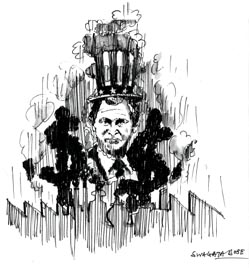Bush discards green
 By dislodging every attempt for progressive green legislation from very early on in his presidency, George Bush is proclaiming his disregard for the environment and open support for expanding energy supplies. He is making no attempt to balance the two. He is also proving to be a poor role model for other world leaders who are keen to save the earth. The greens are being pushed to declare a holy war against him and it is no wonder that he is being called "the worst president for the environment, since Ronald Reagan.'
By dislodging every attempt for progressive green legislation from very early on in his presidency, George Bush is proclaiming his disregard for the environment and open support for expanding energy supplies. He is making no attempt to balance the two. He is also proving to be a poor role model for other world leaders who are keen to save the earth. The greens are being pushed to declare a holy war against him and it is no wonder that he is being called "the worst president for the environment, since Ronald Reagan.'
President George W Bush is willing to poison the earth with greenhouse gases and arsenic. He is clearly an oil and gas person (as The Washington Post columnist Mary McGrory mockingly labels him) with little patience for anything else. Carbon dioxide in the air, oil spills in the white, pristine tundra, arsenic in water, mining debris and nuclear wastes left unattended, asphalt roads invading forests and the extinction of rare flora and fauna for lack of habitat leave him and his aides unperturbed. His agenda is aptly described by his official spokesperson Ari Fleischer, "The President believes that high energy consumption is an American way of life, and that it should be the goal of policy makers to protect the American way of life. The American way of life is a blessed one.'
In February this year, the arithmetic arguments of 600 climate scientists of the Intergovermental Panel on Climate Change ( ipcc ) shook the world with its calculations on climate change and dire warnings of its fall-outs. Detailing the travails of a hotter world, the 1,000-page report underlines that future changes will be twice as severe as revealed five years ago. Predictions range from worldwide deaths due to erratic and extreme weather, increase in respiratory and vector-borne diseases, crop failures, water wars, displacement of millions by floods to increase in wildfires. Facing stiff opposition from coal and oil lobbies, President Bush, however, chose to reverse on his campaign pledge on March 13 and said he would not seek reductions in the carbon dioxide emissions from the nations' power plants. Quoting a recent study of the Energy Department, he argues that restrictions in carbon dioxide emissions would result in a shift from coal to natural gas and lead to higher energy costs. And maintained no economic discomforts for the United States. The result: the Kyoto Protocol signed in 1997 to bind industrialised countries to cut their emissions of greenhouses gases fell into disarray.
The greens are predictably outraged and harshly critical of his lack of position on global warming. Is he rejecting the entire Rio process or just the Kyoto Protocol is the topmost question in their mind. In a bid to calm them, the Bush administration has promised to come up with alternatives to the Kyoto Protocol before the fresh round of international climate talks in July. It is also set to sign the Stockholm Convention on Persistent Organic Pollutants to reduce the release of dangerous chemicals and curb the use of 12 chemicals.
But the greens are not to be so easily assuaged. Their ire is now directed at Bush's brand new energy policy, planned and executed without the participation of environment groups but with the active aid of oil and gas lobbies. Philip E Clapp, president, National Environmental Trust ( net ), a nongovernment organisation that critically appraises the government's green policies, angrily retorts, "When you go behind closed doors and write the nation's energy policy with industrial lobbyists what you get is a plan that benefits corporations, not consumers.'
net has released a comprehensive report just prior to the plan release called America and Energy in 2001
